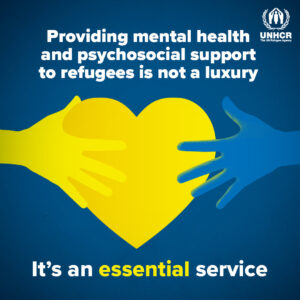May 15, 2024
Written by: Mirjana Omeragic, Senior Director of Refugee Services

Although mental health is a topic we must discuss daily, May is the perfect month to raise awareness. As someone who came as a refugee to this country, I would like to focus on newcomers, those who were born outside of the United States, and the importance of culturally responsive services when addressing mental health in these communities.
During my journey as a refugee, I have learned many things about life and humanity. I’ve learned that life circumstances can change overnight, and every one of us can find ourselves in a new and unfamiliar world in the blink of an eye. I’ve learned that every human being seeks human kindness and sometimes it takes only one word to make or destroy someone’s day or life.
The experience of forcible displacement, the uncertainty of the future, loss of loved ones, separation from everything you love and know, and often torture and persecution would impact anyone. Everyone has their way of coping and dealing with these hardships, but it takes time and courage to start talking about it. This is especially important when we are talking about people who came from cultures where the stigma surrounding mental health is so extreme that seeking help is seen as a sign of weakness or that an individual is “crazy.”
Therefore, it is critical to provide culturally responsive services and understand the cultural, religious, and social barriers newcomers face when accessing mental health services. Mosaic provides culturally and linguistically competent case management services to newcomers. Our multicultural staff understands refugees’ barriers and helps them overcome those barriers. They give the newcomers appropriate resources and help them access them in their native language.
The best practices are to think creatively and find alternative ways to address this crucial topic.
One example of an alternative way to address mental wellness is Mosaic’s Espresso Yourself coffee chat group. This group allows refugees to talk about their feelings and learn how to cope in an amazingly comfortable setting where they feel safe to share their stories, worries, and tears. They realize that they are not alone and that after everything they went through, feeling hopeless, alone, sad, or depressed is nothing to be ashamed of – it is okay not to be okay. As a result of these groups, more newcomers became comfortable with counseling and behavioral health services.
To help other mental health practitioners communicate effectively with refugee populations and understand the stigma associated with mental health in their cultures, I started the Refugee Mental Health Coalition two years ago. The coalition aims to create partnerships, raise awareness about the importance of culturally and linguistically appropriate services, and invite other agencies to join our coalition and learn about the challenges newcomers face regarding mental health services. Recently, with the help of all coalition members, we created the Newcomers Mental Wellness Guidebook, which you can access from the link below. This guidebook will help newcomers find resources that provide services in different languages and make accommodations for low-income families and those who do not have health insurance. It will also help mental health practitioners to find and refer newcomers to places where they can receive services designed to address their needs.
I would like to end this blog with my favorite quote – “Everyone you meet is fighting a battle you know nothing about. Be kind. Always.”
Access the guidebook here: https://mosaicservices.org/wp-content/uploads/2024/05/FINAL_WCIA_MentalWellnessGuide_v2.pdf
